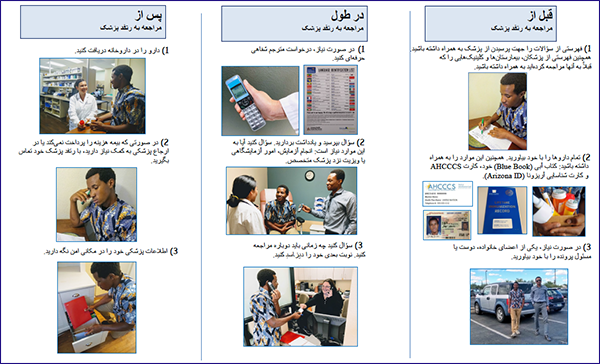Helping Refugees Learn to Navigate the U.S. Healthcare System
Navigating the complex healthcare system in our country is difficult for anyone. This task is even more challenging for individuals with language or cultural barriers and those who have arrived recently in the U.S. Learning how to prepare for and fully participate in a medical appointment is not only essential for accurate diagnoses and appropriate medical care, but also for documentation of any medical impairments to qualify for disability related benefits.
With the help of many community partners and volunteers, TFAP created and revised a multi-level health literacy teaching tool, “What to do Before, During, and After your Medical Visit”. It has been translated into seven languages so far: Arabic, Kinyarwanda, Tigrinya, Swahili, French, Farsi and Nepali.
 Many people collaborated on this project by providing feedback on revisions to this health literacy tool or with the translation and verification process. We want to thank our refugee resettlement partners at the Arizona Refugee Resettlement Program, IRC-Tucson, Lutheran Social Services of the Southwest and Catholic Community Services; the Refugee Women’s Health Clinic; medical providers at Banner – University Medicine Family Medicine Clinics; student interns; volunteer actors; U. Arizona Peace Corps Coverdell Fellow; and teachers at Pima Community College ESL program for refugees for their collaboration and expertise to help improve use of this tool for individuals with varied literacy levels and languages.
Many people collaborated on this project by providing feedback on revisions to this health literacy tool or with the translation and verification process. We want to thank our refugee resettlement partners at the Arizona Refugee Resettlement Program, IRC-Tucson, Lutheran Social Services of the Southwest and Catholic Community Services; the Refugee Women’s Health Clinic; medical providers at Banner – University Medicine Family Medicine Clinics; student interns; volunteer actors; U. Arizona Peace Corps Coverdell Fellow; and teachers at Pima Community College ESL program for refugees for their collaboration and expertise to help improve use of this tool for individuals with varied literacy levels and languages.
For the best display, print double-sided on 8 x 14 legal size paper. It can then be folded as a trifold pamphlet with photos and simple text on one side and more detailed information on the same topics on the back side. The teaching tool and Pre/Post Teaching Survey can be used for any non-commercial educational purpose including refugee healthcare orientations, ESL classes, or in individual teaching opportunities with your refugee clients or patients. Please send any completed surveys or other feedback on how you are using this tool at your agency or clinic to teeple@email.arizona.edu or by FAX to 520.874.7141.




